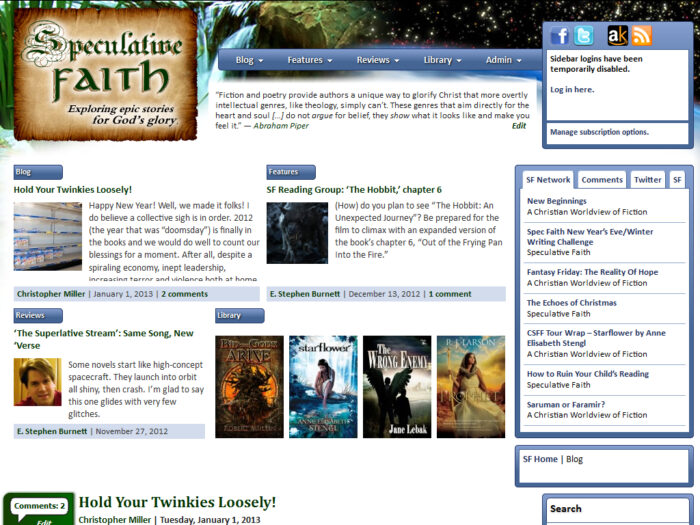Yes, Speculative Faith Is Closed, At Least For Now
This headline won’t shock most of you. That’s because we haven’t published new stuff at Speculative Faith since Travis Perry’s “Last Stand” article in July 2021. Why?
In short, yes, ‘tis true: the Speculative Faith portal has closed, at least for a season.
For my part, I’ve tarried in sharing any “official” summary about this mainly because of time constraints. Now it’s the year’s end, when I have more time off for planning and resting. The explanation requires some reminders about SpecFaith’s original purpose and how it’s created, followed by behind-the-scenes reasoning, then hope.
(I’m sharing this article both at Lorehaven and at the Speculative Faith portal.)
Aspiring authors first started Speculative Faith in 2006

2006: The original Speculative Faith site featured this fantastical banner.
I am not the father of the website. SpecFaith started in summer 2006. It featured authors Carol Collett, Shannon McNear, Rebecca LuElla Miller, Mirtika Schultz, Stuart Stockton, and many others. Stuart hosted version 1.0 on his platform. After I met some of the team at a conference, I joined that fall.1
Here’s what Mirtika Schultz wrote in her first article, “What is Speculative Faith?”:
We are writers who share two passions—a genre and a Savior.
The genre is speculative literature. That ‘s the umbrella term that covers fantasy, science fiction, and allegory in all forms: short story, novella, novel, screenplay, and poetry.
The Savior is Christ. That is the faith part.
Genre + Christ: Speculative Faith
This team blog, Speculative Faith, will offer you our individual perspectives—and we don’t always agree—on any matter that resides in that spacious spot where our faith and our preferred genre blend.
And we’re an idealistic, motivated group:
~~ We believe that there is a diverse and sizable audience hungry for Christian speculative literature.
~~We want to find you.
~~We want you to find us.
~~We want to mobilize a reading and writing community that will impact the future editorial acquisitional decisions of CBA publishing houses. Right now, they are not favorably inclined toward speculative fiction.
This approach largely continued until about 2008. That’s when writer contributions dropped off, and the original Speculative Faith platform grew overrun by gremlins.

Longtime fantasy writer Rebecca LuElla Miller has created for SpecFaith from its 2006 origin.
New creators helped reboot Speculative Faith in 2010
For my part, I couldn’t go gremlin-bashing much myself. I was getting married and experiencing other life reboots. Yet the site’s name and popularity warranted a regeneration. In 2010, I re-recruited some of the team (especially the incomparable Rebecca LuElla Miller!). We restarted Speculative Faith with its own domain, a new software platform, and aspirations for more than courting Christian publishers.2
“It’s like The Doctor,” I wrote in August 2010 about that Speculative Faith restart. “Our regeneration cycle is complete. New face, new plots: same entity.”
That quote brings a truth that bears repeating: Yes, Speculative Faith has died before.
Just like The Doctor—before he regenerates with a new face.
Just like any other superhero who sacrifices his time or life for a greater cause—and then ends up returning from death, or from another dimension, to carry on.

New Year’s Day, 2013: Speculative Faith’s updated homepage.
SpecFaith has carried the Christian-fantastic torch
Carry on we did, running for more than ten years. For my part, I’ve paid out-of-pocket for hosting, and labored often for graphic and web design. As we saw many gains in Christian fantasy publishing, we often upped our editorial game. I found myself taking a greater role in acquiring new writers, attempting featured articles plus news posts and reviews, and spending hours editing for clean web-based copy.
Still, SpecFaith has not been a fantasy publisher or corporation. SpecFaith has never earned profit, created print resources, or paid any of its writers. The site has seen many volunteers come and go. Most have written articles as extensions for their own fantasy novel publication goals.3
As for those gains among Christian fantasy publishers? Many of these companies have tried valiantly to acquire the best fantasy for publication. To a large extent, many of those efforts appealed to other writers, who saw those novels as symbols of their own potential publishing success. With some exceptions, we saw Christian-made fantasy gain limited attention from broader, non-writer evangelical markets.
That’s why I began trying a stronger editorial hand with SpecFaith. “You’re not first a writer,” I strongly encouraged guests. “You’re a fan. If we only talk about writing to other writers, we’re only engaging in shop talk. This alienates potential readers, and limits the appeal of Christian-made fantasy only to a separate creative class.”

2015: Speculative Faith logo and revised motto.
Gradually, SpecFaith turned closer toward that ideal of becoming a fan-based resource. This led to my 2018 launch of the expanded Lorehaven project: a more-structured and fan-centered resource to find the best Christian-made fantasy.4
Plagues and other plotlines affected SpecFaith in 2020
All these volunteer tasks may take their toll. Especially during an actual plague.
Last year, alas, we might count Speculative Faith as another victim of the COVID-19 regulations (2020–present). Some writers withdrew to work extra paid jobs. Some struggled with many health or career crises. For my part, I kept going with the site, finding guest articles, frequently editing content, and sharing on social media—working double to maintain both SpecFaith and the burgeoning Lorehaven cousin.
All that takes time. And for my part, soon I also had to work longer day-job hours, plus buying a house, plus becoming an emergency backup dad for two teenagers, plus stepping up my paid freelance-writing game as well as my own novel-creation work, plus finishing my first published (nonfiction) book and planning promotional efforts. I chose to phase out the Lorehaven print issues (suitable mainly for writers’ events) and shift to an all-digital platform. Any of my SpecFaith content work fell by the wayside—just as the content had been decreasing from other contributors.
This makes sense. It’s not just The Dark Knight’s Joker who warned, “If you’re good at something, never do it for free.” Creators who “work for the exposure” can often find fresh air and sunshine. But in harsher weather, people also die from exposure.
At present, and alas, Speculative Faith has experienced this kind of slow death.

The Tenth Doctor (David Tennant) regenerates in the long-running BBC sci-fi dramedy Doctor Who.
SpecFaith could regenerate in God’s good time
We’ve heard from readers who’ve asked: (1) So is Speculative Faith now dying? (2) Is SpecFaith being “shut down”? (3) Can I write for SpecFaith?
For my part, anyway, here are my brief answers:
- Yes, Speculative Faith is dead for now, if only because of lacking new content.
- No one is shutting it down. It still exists with its near-complete archive.
- For now, we are no longer acquiring new content for Speculative Faith, because every new article requires several hours for planning, editing, and social-sharing. At present, I’m the only person positioned to do all that, and my schedule is full. I must prioritize other creative callings that can support the project’s own costs and my family (and eventually, my own novel publication projects).
To elaborate on this mission, I (not SpecFaith!) personally feel we have less need for more from-writers-to-writers content. Since SpecFaith began, many publishers and indie authors have published more Christian fantastical novels. Many of these novels show fantastic craft and worldbuilding skill. So far, however, most of them have not yet gained much popularity beyond smaller circles of writer friends.
In response, it’s tempting for Christian writers to assume we need to Raise More Awareness about Writing, emphasizing craft, beta readers, agents, and KDP. But they still can’t help writing mainly about writing for other writers. This is a cultural bubble. Many Speculative Faith writers, and now Lorehaven, seek to grow out of it.

Travis Perry: author, editor, publisher, and true believer in the SpecFaith mission.
At the same time, I recognize what my colleague Travis Perry has argued: We will always need Christian fantasy writers who speak openly about this vocation, and defend biblical training of our imaginations while opposing false teaching.
I’ve heard one rumor of a writer hoping to restart the site in spring, with renewed emphasis on writer-talk. However, we’ve made no firm plans for that.
Still, could Speculative Faith regenerate again? Could the site return for a new season, acting clever and cracking wise, with new faces, new content, and a new redecoration for its TARDIS? Possibly so. In God’s good time, I hope this will be so. Our own Author, however, would need to provide the regenerative energy.
And I believe the new regeneration is best powered by more than wishes, but also by professional craft, structure, and mission to serve fans, not just niche writers.
May our Author grant Speculative Faith a third life, however soon, in his good time.
Meanwhile, the saga continues among many fans who cultivate gospel growth in their fantastical books and resources, including but not limited to Lorehaven (for fans) and Realm Makers (for writers). So long as the Church continues its mission on Earth, we will need Bible-shaped imagination. Whatever temporary life God grants our own platforms, that good gift from him will endure for eternity.
- My first article attempted a now-dated comparison of my favorite stories to the “widescreen” film format. ↩
- Alas that some articles from the original platform failed to make the migration. ↩
- Many SpecFaith contributors, such as John W. Otte and Morgan L. Busse, have since found success as fantastical fiction novelists. Once we even hosted an article from author/singer Andrew Peterson. ↩
- A little more backstage info: Unlike Speculative Faith, Lorehaven has an editorial structure with production teams for articles, reviews, podcast episodes, and gift merch. We have creative organized processes with social apps and calendars and everything. Also, we get to pay designers and reviewers and more, thanks to sponsor support. In short, we are slowly building a true digital publisher, not of fantastical novels, but of nonfiction about fantastical fiction.
In January 2020, Lorehaven also started the Fantastical Truth podcast. I stepped back from weekly SpecFaith articles to focus on podcast production. Thank God, it’s working. Lorehaven and the podcast have been reaching many new fans. ↩









































Farewell, friends.